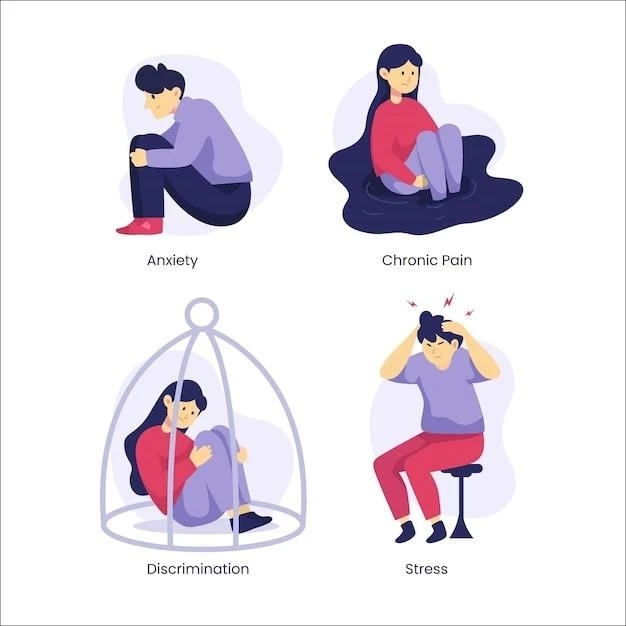Dependent Personality Disorder
Dependent Personality Disorder is a psychological disorder characterized by traits such as insecurity‚ clinginess‚ low self-esteem‚ and an intense need for approval. Understanding this disorder is crucial in addressing its impact on individuals and their relationships.
Dependent Personality Disorder is a mental health condition marked by an excessive need to be taken care of‚ leading to submissive and clingy behavior. Individuals with this disorder often experience low self-esteem‚ fear of abandonment‚ and an overwhelming desire for approval from others. They tend to be passive‚ indecisive‚ compliant‚ and obedient to avoid disapproval or rejection. This chronic neediness and reliance on others for emotional and physical needs can significantly impair their ability to function autonomously;
People with Dependent Personality Disorder may lack confidence in their abilities and judgment‚ seeking constant reassurance and support from others. This reliance on external validation can hinder their personal growth and independence. Additionally‚ they may have difficulties making decisions‚ even in relatively simple matters‚ and may defer to others to make choices on their behalf.
Understanding the psychological profile of individuals with Dependent Personality Disorder involves recognizing their deep-seated fear of abandonment and rejection‚ which underpins their behaviors and thought patterns. These individuals often prioritize maintaining relationships at all costs‚ even if it means sacrificing their own needs and desires. Their sense of self-worth is intertwined with the approval and acceptance they receive from others‚ leading to a constant pursuit of validation and acceptance.
It is important to approach Dependent Personality Disorder with empathy and sensitivity‚ recognizing that the behaviors exhibited by affected individuals stem from underlying psychological issues rather than mere character flaws. By understanding the complexities of this disorder‚ mental health professionals can provide effective support and interventions to help individuals with Dependent Personality Disorder lead more fulfilling and autonomous lives.
Symptoms and Behaviors
Individuals with Dependent Personality Disorder commonly exhibit a range of symptoms and behaviors that reflect their deep-seated need for reassurance and support. Some of the key signs of this disorder include an excessive need to be taken care of‚ leading to clingy and submissive behavior. People with Dependent Personality Disorder often struggle with making everyday decisions without excessive advice or reassurance from others‚ reflecting their indecisiveness and fear of disapproval.
Moreover‚ individuals with this disorder may have difficulty initiating projects or tasks independently‚ instead relying heavily on others to take the lead. They may go to great lengths to obtain nurturing and support from others‚ even at the expense of their own needs and autonomy. This can manifest in a reluctance to voice disagreement or make independent choices‚ leading to a pattern of compliance and obedience in interpersonal interactions.
People with Dependent Personality Disorder may also exhibit heightened sensitivity to criticism or rejection‚ as their self-esteem is often contingent on external validation. They may constantly seek approval from others and have a pervasive fear of abandonment‚ driving them to maintain close relationships and avoid conflict at all costs. This intense need for approval and reassurance can significantly impact their emotional well-being and social interactions.
Furthermore‚ individuals with Dependent Personality Disorder may struggle with establishing boundaries in relationships‚ often prioritizing the needs and desires of others over their own. Their pervasive sense of neediness and reliance on external sources of validation can lead to difficulties in developing a strong sense of self and asserting their independence. These symptoms and behaviors highlight the complex interplay of emotional vulnerability‚ approval-seeking tendencies‚ and fear of abandonment that characterize Dependent Personality Disorder.
Psychological Profile of Individuals
Individuals with Dependent Personality Disorder often exhibit a distinct psychological profile characterized by deep-seated insecurities‚ low self-esteem‚ and a pervasive fear of abandonment. Their sense of self-worth is heavily reliant on external validation and approval from others‚ leading to a constant need for reassurance and support. These individuals may engage in submissive and clingy behaviors in relationships‚ seeking to maintain closeness and avoid rejection at all costs.
Moreover‚ people with Dependent Personality Disorder tend to be passive‚ compliant‚ and indecisive‚ preferring to defer to others in decision-making and relying on external sources of guidance and direction. Their emotional well-being is closely tied to the perceived acceptance and approval of those around them‚ driving them to prioritize relationships over their individual needs and desires. This need for external validation can contribute to a cycle of approval-seeking behavior that reinforces their feelings of inadequacy and dependency.
Individuals with Dependent Personality Disorder may struggle with setting boundaries in relationships‚ often placing the needs of others above their own in an effort to maintain connection and avoid conflict. Their tendency to be overly reliant on others for emotional support and decision-making can hinder their personal growth and autonomy. Despite their compliance and obedience‚ these individuals may experience internal turmoil and anxiety related to their fear of abandonment and rejection.
Understanding the psychological profile of individuals with Dependent Personality Disorder is essential for providing them with the appropriate support and interventions to address their complex emotional needs and promote healthier relationship dynamics. By recognizing the underlying insecurities and fears driving their behaviors‚ mental health professionals can work towards helping these individuals develop greater self-esteem‚ autonomy‚ and resilience in navigating their interpersonal relationships.
Impact on Relationships and Daily Life
Dependent Personality Disorder can have profound effects on relationships and daily functioning. Individuals with this disorder may struggle to establish and maintain healthy boundaries‚ often prioritizing the needs of others over their own. This can lead to issues such as resentment‚ codependency‚ and difficulty asserting personal preferences.
In relationships‚ people with Dependent Personality Disorder may exhibit clingy and needy behavior‚ seeking constant reassurance and validation from their partners. Their fear of abandonment can result in an overwhelming desire to please others‚ even at the expense of their own well-being. This can lead to emotional exhaustion and strained relationships as their excessive reliance on others can become burdensome.
The impact of Dependent Personality Disorder extends beyond relationships to daily activities. Individuals with this disorder may find it challenging to cope with stressors and uncertainties independently‚ relying on others for emotional support and direction. This can result in difficulties at work or in academic settings‚ as their need for approval and reassurance may undermine their confidence and decision-making abilities. Diagnosing Dependent Personality Disorder involves a comprehensive evaluation by a mental health professional. They will assess the individual’s symptoms‚ behaviors‚ and psychological history to determine if the criteria for the disorder are met. This may include interviews‚ self-report questionnaires‚ and observations of the individual’s interactions and relationships. Treatment for Dependent Personality Disorder often involves psychotherapy as the primary intervention. Cognitive-behavioral therapy (CBT) can help individuals challenge and modify maladaptive thought patterns and behaviors associated with dependency and low self-esteem. Therapy can also provide a safe space for individuals to explore their fears of abandonment and work on building self-confidence and autonomy. Another effective treatment modality is psychodynamic therapy‚ which focuses on exploring unconscious patterns and dynamics that contribute to dependency issues. Through insight-oriented therapy‚ individuals can gain a better understanding of the root causes of their dependence and develop healthier coping strategies. Medication may be prescribed in some cases to manage symptoms of anxiety or depression that often co-occur with Dependent Personality Disorder. However‚ medication is typically used in conjunction with psychotherapy rather than as a standalone treatment. Family therapy and support groups can also play a valuable role in the treatment process‚ helping individuals with Dependent Personality Disorder and their loved ones understand the dynamics of the disorder and work towards establishing healthier relationship patterns. Overall‚ a comprehensive treatment approach that addresses the psychological‚ emotional‚ and social aspects of Dependent Personality Disorder is essential in promoting long-term recovery and improved quality of life. Individuals with Dependent Personality Disorder can benefit from learning effective coping strategies to manage their symptoms and improve their quality of life. Developing self-care routines‚ setting boundaries in relationships‚ and enhancing self-esteem are key components of coping with this disorder. Therapeutic techniques such as mindfulness and stress management can help individuals with Dependent Personality Disorder regulate their emotions and reduce anxiety related to dependence and fear of abandonment. By practicing relaxation techniques and grounding exercises‚ individuals can learn to navigate challenging situations with greater resilience. Building a support network of understanding friends‚ family members‚ or support groups can provide individuals with Dependent Personality Disorder with a sense of community and validation. Connecting with others who share similar experiences can reduce feelings of isolation and offer a space for mutual understanding and encouragement. Engaging in activities that promote independence and self-reliance‚ such as pursuing hobbies or interests outside of relationships‚ can help individuals with Dependent Personality Disorder develop a stronger sense of self. By focusing on personal growth and self-development‚ individuals can cultivate a more balanced and fulfilling life beyond their dependence on others. Seeking ongoing therapy and counseling is crucial for individuals with Dependent Personality Disorder to address underlying issues and develop coping skills. Therapists can provide guidance‚ support‚ and validation as individuals navigate their emotional struggles and work towards greater autonomy and well-being. With the right tools and support‚ individuals with Dependent Personality Disorder can learn to manage their symptoms effectively and build more fulfilling and balanced lives. Addressing stigma and misconceptions surrounding Dependent Personality Disorder is essential for promoting understanding and empathy towards individuals affected by this condition. Misconceptions about dependency and neediness can lead to judgment and bias‚ hindering individuals from seeking help and support. It is crucial to educate the public about the complexities of Dependent Personality Disorder and challenge common stereotypes that suggest dependency is merely a sign of weakness or laziness. By raising awareness about the psychological roots of dependency and the impact it can have on individuals’ lives‚ we can work towards reducing stigma and fostering greater acceptance and support. Encouraging open and respectful dialogue about mental health conditions‚ including Dependent Personality Disorder‚ can help dispel myths and promote a more compassionate attitude towards those struggling with dependency issues. By creating a safe space for individuals to share their experiences and challenges‚ we can foster a culture of understanding and empathy. Providing accurate and evidence-based information about Dependent Personality Disorder through educational campaigns‚ media representation‚ and community outreach efforts can help combat misconceptions and promote mental health literacy. By encouraging informed discussions and destigmatizing dependency‚ we can create a more inclusive and supportive environment for individuals living with this disorder. Supporting initiatives that promote mental health awareness and advocate for the rights of individuals with Dependent Personality Disorder is crucial in challenging discrimination and promoting inclusion. By recognizing the humanity and dignity of all individuals‚ regardless of their mental health challenges‚ we can create a more compassionate and understanding society that values the well-being of every individual.Diagnosis and Treatment Options
Coping Strategies and Support

Addressing Stigma and Misconceptions
